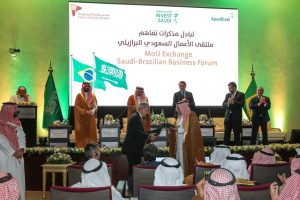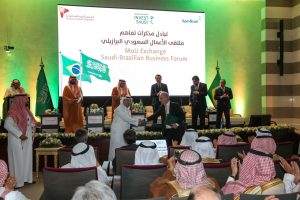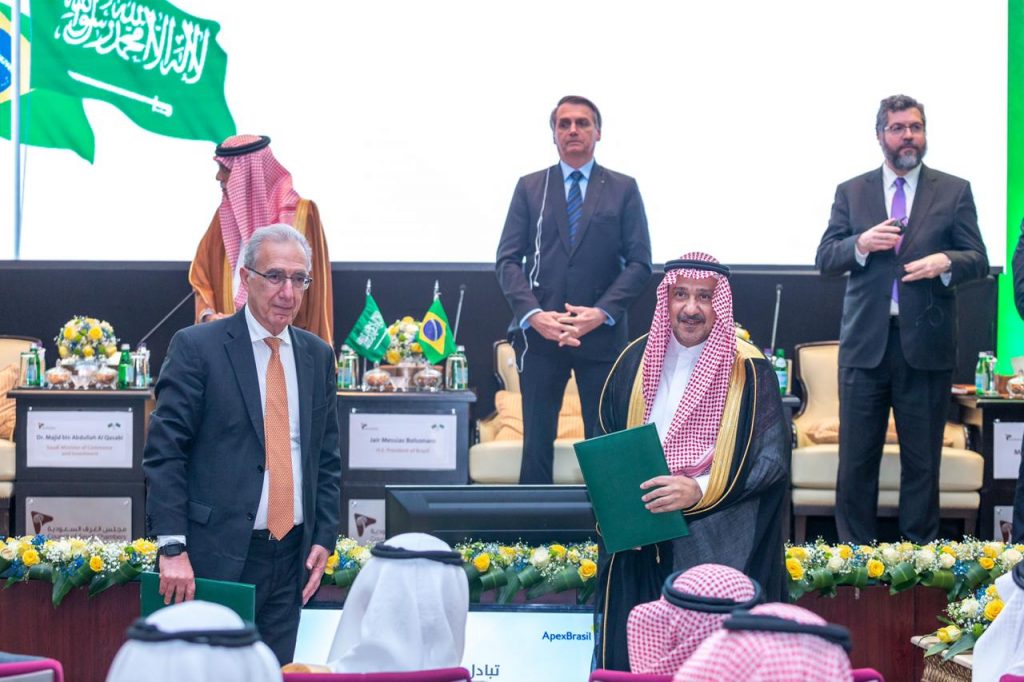Riyadh – The Arab Brazilian Chamber of Commerce signed cooperation agreements with three Saudi institutions during the Saudi Brazilian Business Forum this Tuesday (30) in Riyadh. It was president Jair Bolsonaro’s last appointment in his travel to Saudi Arabia.

The agreement reached by Arab Chamber president Rubens Hannun and Saudi Arabia General Investment Authority (SAGIA) deputy governor Sultan Mofti is aimed at promoting investment in small- and medium-sized enterprises as well as startups in both Brazil and Saudi Arabia. An action plan will be created to be implemented in 2020.
The seminar also featured Brazilian ministers of Foreign Affairs, Ernesto Araújo; Chief of Staff, Onyx Lorenzoni; Science and Technology, Marcos Pontes, and Citizenship, Osman Terra; as well as Saudi minister of Industry and Investment, Majid Bin Abdullah Al Qasab; and Brazilian Trade and Investment Promotion Agency (Apex-Brasil) president; and businesspeople from both countries.
Another agreement is with Saudi Industrial Clusters, an industrial development agency in the Arab country. According to Hannun, the idea is to encourage investment in both nations across ten industrial sectors defined as priorities by Saudi Arabia in its strategic plan Vision 2030.
According to the agency’s Investment Promotion adviser, Adalberto Netto of Brazil, the ten priority industries are aerospace, defense, automotive, building material, chemical, medical equipment, pharma, iron and steel, renewable energies, and food.
He explained that the petroleum industry, including oil products and petrochemicals, accounts for 80% of Saudi economy, and the organization’s mission is working for diversification. “Industry is the strategic alternative for Saudi Arabia’s future,” he said.
Besides bringing companies into the country, the purpose is to gather know-how in advanced sectors. In Brazil, through a partnership with the Arab Chamber, Industrial Clusters will announce its goals and make contact with potential stakeholders. “There are over 400 investment options mapped and identified,” Netto pointed out.

Hannun added that the agency offers incentives for foreign companies. He stressed that next Thursday (31) he’ll have a meeting with the organization’s president Nizar Al-Hariri, whom he signed the agreement with, to address the action plan to be implemented in 2020.
He believes this is an example of the evolved relations between both countries that permeated the mission organized by the Brazilian government. “Partnerships were laid down and will soon be implemented,” he said.
At the Future Investment Initiative (FII), the conference known as “Davos in the Desert,” which took place this week in Riyadh, Industrial Clusters signed agreements with other Brazilian organizations: Instituto Butantã to produce vaccines in Saudi Arabia and companies Eurofarma of medicines and Aeries of wind blades to do feasibility studies on investment in the Arab nation.
ANBA and Arab News
Hannun also signed an agreement between ANBA and the Saudi English-language newspaper Arab News (pictured at the top) allowing content interchange. Now, the Brazil-Arab News Agency has 11 agreements of this kind with news outlets in the Arab world and Brazil.
Hannun signed the document with Arab News deputy editor in chief Tarek Mishkhas. “Businesses nowadays are more information-based and we didn’t have an agreement in Saudi Arabia; now we have a strong one,” stressed the Arab Chamber president.
Founded in 1975 in the city of Jeddah, Arab News is Saudi Arabia’s first and largest English-language newspaper. ANBA is the Arab Chamber’s official news agency and was created in 2003 to promote Brazilian-Arab communication. It is available in Portuguese, English and Arabic.
“This agreement will boost information, which will become quicker both from Brazil to Saudi Arabia and from Saudi Arabia to Brazil,” stressed Hannun.
Translated by Guilherme Miranda




